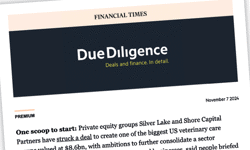Ladies, Gentlemen .......
May God strike me down but as this is a Society of Editors Conference I have a grotesquely hubristic confession to make .... from virtually the moment I was born, I wanted to be an editor.
Not just wanted, if I’m being honest. Hungered ..... Lusted with a passion that while unfulfilled, would gnaw at my entrails. Thus it was that my early years were but a long frustrating apprenticeship for the editorship I had to have.
Hugh Cudlipp’s "Publish and Be Damned", and Arthur Christiansen’s "Headlines All My Life" were my much-thumbed bibles. All those glorious memoirs by James Cameron, that brilliant reporter, were my text books.
At the wonderful school, to which I was lucky enough to win a state scholarship, I edited the school’s magazine.
I decided to devote a whole issue to the evangelical preacher Billy Graham whose mass revivalist meetings were a phenomenon of mid-60’s Britain.
Doubtless influenced by the possibility that they might view my A-Level essays in a more benign light, I asked several of the most intellectually impressive masters to attend a Graham gathering and write about their impressions.
It was a journalistic disaster. Without exception, their words were ponderous, prolix and achingly dull. The issue went down like a sodden hot cross bun.
Lesson One: Brains and education have little to do with the craft of journalism which is to ferret for information and then explain it clearly, informatively and above all, entertainingly. Journalists are born, not made, and all the media schools in the world won’t change that. Also: dull doesn’t sell newspapers. Boring doesn’t pay the mortgage.
In the next issue, I discretely secreted a couple of expletives into an article. It was child’s stuff by the standards of Messrs Brand and Ross but they got me into terrible trouble with the headmaster. The magazine, needless to say, sold out but my relationship with the school was never quite the same again.
Lesson Two: Sensation sells papers. Editors are troublemakers who invariably fall out with the authorities. Editors can’t get too close to anyone. Too often those who befriend them, do it for one of two reasons: they want to get something into the paper or, more likely, keep it out. A good editor has to be an outsider. Being an outsider can be very lonely.
At Leeds University, my tutor was the modern poet, Geoffrey Hill. Probably wisely, he never bothered to mark my essays. In tutorials, wearing the comically opaque glasses that were his hallmark, he would, while holding forth on the metaphysical poets, peck at sunflower seeds from an old yeast jar, while occasionally fulminating against the Rothermere press. What John Donne had to do with the Harmsworths, I don’t recall. I am, however, delighted, over the years, to have made my own small contribution to the chattering classes’ dyspepsia with the Rothermere press – but then no day is too busy or too short not to find time to tweak the noses of the liberalocracy which effectively run Britain.
At university, I edited the student newspaper. I’m afraid I took a product that looked like the then Times on Prozac and turned it into a raucous version of Cudlipp’s Mirror complete, I shudder to admit, with Page 3 girl students whom I dubbed "Leeds Lovelies".
We mounted an undercover investigation, complete with photographers, into seemingly respectable pubs that were putting on strip shows. Family entertainment it wasn’t. The Yorkshire Post which engraved the blocks for our pictures – remember those Neanderthal days – refused to process the photographs on the grounds they were obscene. With preposterous pomposity, I accused the Post’s Editor of abusing freedom of the press. He wouldn’t budge so we got the blocks made elsewhere and ran a front page story about censorship by the Post and a student paper that couldn’t be gagged.
And, of course, we sold the pictures to the News of the World for a vast sum and dined out on the proceeds for months to come.
Though I say it myself, the paper was pretty good. It was named Student Newspaper of the Year. A national newspaper wrote a feature about it, praising the wealth of content. This was the year of student demonstrations and its headline above the article was "Why Not All Students Are Revolting". The national newspaper was the Daily Mail.
I wrote thunderous front page editorials in support of a student sit-in at the university’s administration block. It was to protest against the university keeping our records on file – tame stuff compared to the Brown Government’s terrifying proposals that the authorities should have access to every citizen’s internet and mobile phone records.
The sit-in was organised by our Student Union President, a certain Jack Straw, who some 30 years later would as Home Secretary introduce the Human Rights Act and who now presides over no win, no fee legislation, two issues causing our industry so much grief – more of which later.
For a series titled "The Men Who Make Britain", I interviewed the most powerful man in television – Lew Grade. The only time he could see me was 6 o’clock in the morning on New Year’s Day. Hard work, insanely hard work, has been my opium ever since.
Meanwhile, I had become hopelessly addicted to another drug that was made up in equal parts of words, intros, picture crops, headline counts, ideas, campaigns, passions, sensation and the sheer bloody mischief that is the chemistry of any good paper.
Yes, it was in my blood. My father was a journalist. After leaving school at 15, he’d worked on the Doncaster Gazette and a soon-to-close magazine called News Review before arriving at 21 in the Fleet Street of the Fifties where journalists were fired in the morning, hired by another paper in the afternoon and where salaries were low, expenses high and alcohol consumption was stratospheric.
Eventually my father was to get a job on the Sunday Express where he would stay for the rest of his life as, respectively, a reporter, editor of their gossip column called Ephraim Hardcastle, American correspondent, Foreign Editor and Showbusiness Editor in those exciting pioneering days of television, when programmes would attract audiences of 20 million and the medium was run by men of moral vision.
At that time, the Sunday Express – much parodied but never equalled – was arguably one of the most successful newspapers in post-war history. It was produced by a handful of highly creative journalists, had a vast high-quality circulation and was hugely profitable. That paper was my journalistic primer.
Most Sundays in the Sixties, my father and I would spend hours discussing the merits or otherwise of that week’s issue. And if I digress here it is because I worry that some of the journalistic skills and values behind the Sunday Express’s success are in danger of being lost today.
So what was the editorial formula identified originally by the brilliant Scottish editor John Gordon and followed with ruthless will by John Junor? Firstly, the paper never, ever, forgot who its readers were and what interested them and their families. Secondly, it told everything through the prism of people.
Page 3 of the Sunday Express said it all. The lead article under the title "Meeting People" was an interview - not with the kind of half-baked trollop who passes as a celebrity these days, but with, say, the mother of a newly chosen British Nobel Prize winner.
Next to it was a large cartoon by Giles whose genius for clean, gloriously warm family humour is matched today only by the Mail’s magnificent Mac. Why this genre of cartooning - which combines superb draftsmanship with a timeless universal humour that often contains great truths - is dying out is a subject for another speech. Anyway, underneath was the "You the Lawyer" column addressing the problems of every day life such as fencing disputes and dog bites. What paper today would have such a low-key, non-newsy page 3. Yet all human life was on that page.
Elsewhere in the paper, the Book Editor’s reviews were beautifully crafted digests with barely a nod to literary criticism. Motoring Correspondent Bobby Glenton’s road tests were exquisitely oblivious to the technical qualities of the vehicle he was driving but consisted of glorious chuckle-rich evocations of the joys of life that appealed to even those who hated cars. And in Hollywood, Roddy Mann’s drop-dead intros, magical words and pyrotechnical metaphors transformed the stars into fabulously witty, romantic creatures that they almost certainly weren’t.
But the most important page in the Sunday Express was the Readers’ Letters column which was placed early in the paper and was the responsibility of the Deputy Editor who did very little else but captain the paper’s cricket team and vet and sub every letter. His challenge was to capture the tears, the tribulations, the laughter, the quirks and the wisdom of everyday family life.
And today, at the risk of provoking collective cardiac seizure among the army of ethics professors at our proliferating media colleges, I can exclusively reveal that the staff, were paid handsome bonuses to write such letters. My father’s contributions were addressed to the two great mysteries of the cosmos: "why does a pack of razor blades always have one rogue blade" and "what is the maximum number of shaves to be had from one blade". Both themes - taken up by countless other readers - ran on the page for many months.
The paper was warm, aspirational, unashamedly traditional, dedicated to decency, middle brow, beautifully written and subbed, accessible, and, above all, utterly relevant to the lives of its readers.
"Only connect" urged EM Forster. The Mail’s Keith Waterhouse possesses that genius to connect. But then there wasn’t one aspect of our craft – reporting, feature writing, sub-editing – that he hadn’t mastered before graduating to his legendary column. Today, I worry that too many journalists write only for other journalists. Columnists who have never really lived in the real world let alone knocked on hundreds of doors, write columns only for their friends. Large parts of the media are increasingly populated by a privileged elite of top university graduates who, too often, have only ever operated in subsidised environments, and are impervious to what the great majority of people are thinking, removed as they are from the commercial imperative of actually connecting with enough readers to make their papers and media outlets financially viable.
Some of you here tonight, I suspect, may sneer at the kind of family-values paper I’ve just described – that almost comic obsession with the letters page. Those values, you’ll argue, belong to another era. Well, maybe. My own view is that some values are timeless. And the fact is that, at its height, the Sunday Express had a circulation of about five million, of whom a staggeringly high percentage were ABC1 readers.
Today, the Sunday Express barely manages a circulation of 600,000. It is, of course, owned by a pornographer, who is contemptuous of journalists and journalism, who’s just curtailed the paper’s pension scheme and who’s now doing away with sub-editors. It was, I would suggest, one of the great acts of perfidy to our profession – one that speaks volumes for the tawdry values of the Blair/Campbell years – that Richard Desmond was judged to meet the legal requirement of being "a fit and proper" person to own a newspaper.
But enough of the past. Donning my hat as Chairman of the PCC’s Editors’ Code Committee, I would like to talk to you a little about where we are on regulation and press freedom issues.
About 18 months ago, I, Les Hinton of News International and Murdoch MacLennan of the Telegraph, had dinner with the Prime Minister, Gordon Brown. On the agenda was our deep concern that the newspaper industry was facing a number of very serious threats to its freedoms.
Firstly, the Freedom of Information Act – one of the few legislative bills to benefit the media – was in danger of being neutered by plans to deny FoI requests on grounds of cost.
Secondly, access to the courts – and the very principle of open justice – were being seriously undermined by proposals to give Coroners new powers to hold inquests in private and even to prohibit publication of the identification of the deceased. We faced the possibility that people could die or be killed in modern Britain without the community having the right to know how or why. There were also proposals to extend the already Draconian reporting restrictions in family courts.
Thirdly, there were the very serious financial implications for newspapers of the Conditional Fee Arrangement, the no win, no fee legislation. Introduced as a well-intentioned measure to help the poor have access to the courts, it was being ruthlessly exploited by unscrupulous lawyers who were ramping up their costs in media cases. Publishers were being faced with huge bills, sometimes running into millions, to defend even the most simple, clear-cut cases.
Costs in CFA cases, as many of you here know, can be almost infinite with lawyers entitled to "success fees" of up to 100% on top of their actual bills. This gives them a positive financial incentive to take relatively straight-forward cases, worth just a few thousand pounds, and run them as long as possible. Adding insult to injury, CFA claimants can take out very expensive ATE (after the event) insurance policies to protect themselves against costs. If they win, the paper has to pay the claimant’s premium, but if they lose - and this is the cynicism of it all – the insurer rarely enforces the charges because the claimant invariably cannot afford to pay.
Let me give you an example: Martyn Jones, an utterly inconsequential MP, sued the Mail on Sunday over their claim that he had sworn at a Commons official. The Mail on Sunday believed it had rock-solid witnesses and decided to fight the case. In the event, they lost and were ordered to pay £5,000 in damages. The MP’s lawyers claimed costs of £388,000 – solicitor’s costs of £68,000, plus 100% success fees, barrister’s costs of £63,000, plus 100% success fees, VAT and libel insurance of £68,000. Associated’s costs were £136,000 making a total of £520,000 costs in a case that awarded damages of just £5,000 in a dispute over a simple matter of fact.
Can it really be right for a QC in a libel case to be paid £7,000 for a day in court whilst the same QC, prosecuting or defending a serious case at the Old Bailey, may receive less than £600 a day – less than a tenth?
The result is that today, newspapers – even wealthy ones like the Mail – think long and hard before contesting actions, even if they know they are in the right, for fear of the ruinous financial implications. For the provincial and local press, such actions are now out of the question. Instead, they stump up some cash, money they can’t afford, to settle as quickly as possible, to avoid court actions – which, if they were to lose, could, in some case, close them. Some justice!
The fourth issue we raised with Gordon Brown was a truly frightening amendment to the Data Protection Act, winding its way through Parliament, under which journalists faced being jailed for two years for illicitly obtaining personal information such as ex-directory telephone numbers or an individual’s gas bills or medical records. This legislation would have made Britain the only country in the free world to jail journalists and could have had a considerable chilling effect on good journalism.
The Prime Minister – I don’t think it is breaking confidences to reveal – was hugely sympathetic to the industry’s case and promised to do what he could to help.
Over the coming months and battles ahead, Mr Brown was totally true to his word. Whatever our individual newspapers’ views are of the Prime Minister – and the Mail is pretty tough on him - we should, as an industry, acknowledge that, to date, he has been a great friend of press freedom.
Firstly, cost restrictions on freedom of information applications were dropped.
Secondly, the proposed restrictions on reporting of Coroners and Family Courts have been shelved, though we need to be vigilant over the latest move to ban reporters from inquests involving national security.
Thirdly, there is to be action on the "scandalous" greed of CFA lawyers. That adjective is not mine, by the way, but Justice Minister’s Jack Straw’s in a recent speech on the subject. For following Number 10’s intervention all those months ago, there have been many constructive meetings between the industry and the Ministry of Justice on what to do about CFA. A few weeks ago, I, Rebekah Wade and Murdoch MacLennan saw Jack Straw who assured us that, in the next few months, he is set to unveil proposals to reform CFA, including capping lawyers’ fees.
And lastly, what of Section 55 of the Data Protection Act with its proposed two year jail sentences for journalists? Again, under the brokerage of Number 10, there were meetings with Jack Straw and his officials.
The Information Commissioner, Richard Thomas, a tenacious and principled fighter whom I have come to admire, and who may even be here tonight, was determined that the jail threat should stay as a deterrent. The industry argued that there were already adequate deterrents in the form of unlimited fines that could be imposed by the courts on those who offended the DPA.
Although there had undoubtedly been abuses, particularly by so-called inquiry agents paid for by newspapers, (and incidentally, such bodies as insurance companies and law firms), no journalist had so far been prosecuted and jail sentences were therefore utterly disproportionate. Most worrying, we argued, the threat of prison would have a hugely damaging effect on legitimate investigative journalism.
We were very much mounting a rear-guard action as the legislation had already had its Second Reading in the Commons. The lobbying on both sides was fast and furious. The Society of Editors Executive Director, Bob Satchwell, was also very active and deserves the industry’s gratitude. Late in the day, the Conservatives in the Lords came out against the jail sentences.
And at the eleventh hour, with days to go before issue was to be voted upon in the Lords, two compromises were reached. It was agreed that the Data Protection Act should be amended so that journalists would have the right to seek out protected information if they had a "reasonable belief" that their actions were in the public interest.
And, more pertinently, the Act was amended so that the jailing clause cannot now be implemented unless the Secretary of State seeks approval from Parliament to activate it.
So that is where we are. The industry has been warned. We must make sure our house in order. Under the auspices of PressBoF, we have produced a guidance note on DPA that has been sent to every paper in Britain. Now it is up to all of us to ensure that our journalists are complying with the Act. At Associated, we are holding seminars on the subject and have written compliance with the Act into our employment contracts.
At the Editors Code Committee, we are considering whether the current provisions of the Code on data protection and our Guidance Notes, as well as the wording in the Editor’s Codebook, can be strengthened. Our problem, of course, is that the Code cannot sit above the law.
So far so good. But there is one remaining threat to press freedom that I suspect may prove far more dangerous to our industry than all the issues I have just discussed.
Put to one side the United Nations’ recent attack on Britain’s disgracefully repressive libel laws that have made London the libel capital of the world – something that should be a bitter source of shame for our judicial system.
Concentrate instead on how inexorably, and insidiously, the British Press is having a privacy law imposed on it, which – apart from allowing the corrupt and the crooked to sleep easily in their beds – is, I would argue, undermining the ability of mass-circulation newspapers to sell newspapers in an ever more difficult market.
This law is not coming from Parliament – no, that would smack of democracy – but from the arrogant and amoral judgements – words I use very deliberately – of one man.
I am referring, of course, to Justice David Eady who has, again and again, under the privacy clause of the Human Rights Act, found against newspapers and their age-old freedom to expose the moral shortcomings of those in high places.
Two cases in particular underline this threat.
Two years ago, Justice Eady ruled that a cuckolded husband couldn’t sell his story to the press about another married man – a wealthy sporting celebrity – who had seduced his wife.
The judge was worried about the effect of the revelations on the celebrity’s wife. Now I agree that any distress caused to innocent parties is regrettable but exactly the same worries could be expressed about the relatives of any individual who transgressed which, if followed to its logical conclusion, would mean that nobody could be condemned for wrongdoing.
But the judge – in an unashamed reversal of centuries of moral and social thinking – placed the rights of the adulterer above society’s age-old belief that adultery should be condemned.
Recently, of course, the very same Justice Eady effectively ruled that it’s perfectly acceptable for the multi-millionaire head of a multi-billion sport that is followed by countless young people to pay five women £2,500 to take part in acts of unimaginable sexual depravity with him.
The judge found for Max Mosley because he had not engaged in a "sick Nazi orgy" as the News of the World contested, though for the life of me that seems an almost surreally pedantic logic as some of the participants were dressed in military-style uniform. Mosley was issuing commands in German while one prostitute pretended to pick lice from his hair, a second fellated him and a third caned his backside until blood was drawn.
Now most people would consider such activities to be perverted, depraved, the very abrogation of civilised behaviour of which the law is supposed to be the safeguard. Not Justice Eady. To him such behaviour was merely "unconventional".
Nor in his mind was there anything wrong in a man of such wealth using his money to exploit women in this way. Would he feel the same way, I wonder, if one of those women had been his wife or daughter?
But what is most worrying about Justice Eady’s decisions is that he is ruling that - when it comes to morality - the law in Britain is now effectively neutral, which is why I accuse him, in his judgments, of being "amoral".
In the sporting celebrity case, he rejected the idea that adultery was a proper cause for public condemnation.
Instead, he declared that because family breakdown was now commonplace, there was a strong argument for "not holding forth about adultery" or, in other words, attaching no greater inherent worth to marriage than to any other lifestyle choice.
Thus no moral delineation was to be made between marriage and those who would destroy it, between victim and victimiser, between right and wrong.
In the Mosley case, the judge is ruling that there is no public interest in revealing a public figure’s involvement in acts of depravity.
What the judge loftily calls the "new rights-based jurisprudence" of the Human Rights Act seems to be ruling out any such thing as public standards of morality and decency, and the right of newspapers to report on digressions from those standards.
But most worrying is that when it comes to suppressing media freedom, the good Justice Eady is seemingly ubiquitous....
It was he who was going to preside in Tesco’s libel case against the Guardian, which was, in the event, recently settled out of court.
It was the same Justice Eady who, in Lord Browne versus the Mail on Sunday, ruled that BP’s shareholders had the right to know that Browne had lied to the court – but did not have the right to know details of his conversations with his boyfriend, despite the paper’s case that they had serious public-interest implications.
Again, it was Eady who found in favour of a Canadian folk singer called Loreena McKennitt, who had objected to the publication of a book about her by a former adviser, Niema Ash. Ms McKennitt did not claim that the book was in any way untrue, merely that it infringed her right to privacy. Never mind Ms Ash’s right to freedom of expression.
And it is Eady who, almost unnoticed here, has the distinction of having provoked the US Congress – in what’s dubbed the Libel Tourism Bill – to consider making English libel judgments unenforceable in America. This follows the judge’s decision to allow a Saudi banker to sue a New York author in the London courts even though she hadn’t published her book in Britain. Not for the first time, it seems that our colonial cousins can teach us a thing or two.
But surely the greatest scandal is that while London boasts scores of eminent judges, one man is given a virtual monopoly of all cases against the media enabling him to bring in a privacy law by the back door.
English Common Law is the collective wisdom of many different judges over the ages. The freedom of the press, I would argue, is far too important to be left to the somewhat desiccated values of a single judge who clearly has an animus against the popular press and the right of people to freedom of expression. I personally would rather have never heard of Max Mosley and the squalid purgatory he inhabits. It is the others I care about: the crooks, the liars, the cheats, the rich and the corrupt sheltering behind a law of privacy being created by an unaccountable judge.
If Gordon Brown wanted to force a privacy law, he would have to set out a bill, arguing his case in both Houses of Parliament, withstand public scrutiny and win a series of votes. Now, thanks to the wretched Human Rights Act, one Judge with a subjective and highly relativist moral sense can do the same with a stroke of his pen.
All this has huge implications for newspapers and, I would argue, for society. Since time immemorial public shaming has been a vital element in defending the parameters of what are considered acceptable standards of social behaviour, helping ensure that citizens – rich and poor – adhere to them for the good of the greater community. For hundreds of years, the press has played a role in that process. It has the freedom to identify those who have offended public standards of decency – the very standards its readers believe in – and hold the transgressors up to public condemnation. If their readers don’t agree with the defence of such values, they would not buy those papers in such huge numbers.
Put another way, if mass-circulation newspapers, which, of course, also devote considerable space to reporting and analysis of public affairs, don’t have the freedom to write about scandal, I doubt whether they will retain their mass circulations with the obvious worrying implications for the democratic process.
Now some revile a moralising media. Others, such as myself, believe it is the duty of the media to take an ethical stand. Either way, it is a choice but Justice Eady – with his awesome powers – has taken away our freedom of expression to make that choice.
I hold no torch for the News of the World but over the years it has broken many significant stories about corruption and sexual wrong-doing and the opinions of its readers carry, in a democracy, no less weight than the infinitely smaller readerships of papers like the Guardian.
If the News of the Word can’t carry such stories as the Mosley orgy, then it, and its political reportage and analysis, will eventually probably die.
That view is not unique to me. Listen to Lord Woolf in a 2002 Appeal Court judgment that found against Gary Flitcroft, the captain of Blackburn Rovers, who was trying stop The People revealing his affairs with a lap dancer and a nursery nurse....
Said Lord Woolf "The courts must not ignore the fact that if newspapers do not publish information which the public are interested in, then there will be fewer newspapers published, which will not be in the public interest."
Or Baroness Hale in the Naomi Campbell Law Lords case in 2004 ......
"One reason why freedom of the press is so important is that we need newspapers to sell in order to ensure that we still have newspapers at all. It may be said that newspapers should be allowed considerable latitude in the intrusions into private grief so that they can maintain circulation and the rest of us can continue to enjoy the variety of newspapers and other mass media which are available in this country."
Are you hearing your colleagues, Justice Eady?
Only last month, Britain’s leading privacy QC, Hugh Tomlinson, declared, in words that should chill all of us, the following.....
"The law of privacy has come a long way in a short time ... We are gradually moving from a position where anything could be published unless it was forbidden to the opposite – nothing can be published unless it can be justified. Under the influence of the Human Rights case law from Strasbourg, we are moving slowly but inescapably towards the stricter privacy protection of French or Italian law."
Is it a coincidence that France now has to spend £1 billion a year subsidising its few remaining pathetically small circulation newspapers, who for years have had to operate under that country’s draconian privacy legislation? Significantly those papers sustained by subsidy, are, if anything, getting worse, not better, with the result that France has even less media diversity.
But, of course, the great problem is that disdain for the more popular elements of the British press is not confined to Justice Eady. Oh no, it’s much closer to home. The real enemy, if you like, is within. For the regrettable truth is that, increasingly, considerable sections of Britain’s media conspire to undermine mass-circulation newspapers.
So tonight I would like to pose the question: why is the British newspaper industry so full of self-loathing?
I have commented before on of what I have dubbed the "subsidariat" – those media outlets who cannot connect with enough readers to be commercially viable, and whose views and journalism are only sustained by huge cross-subsidy from profitable parts of their owners’ empires or by tax payers’ money.
Fair enough. There isa case for subsidy though the longer I live the more I come round to the view that – in most cases - it ultimately perverts everything it touches. In the media, it produces a distorting prism, actually incentivising its recipients to operate in splendid isolationism, far removed from the real world that the great majority of readers and listeners have to live in.
But my question is why does not a day go by that the subsidariat papers – blissfully oblivious of their own pocket-sized shapes and circulations – don’t carry the obligatory sneer at the tabloid press?
Why does not half an hour go by that the high priests of the subsidariat, the BBC, can’t resist a snide reference to the popular press, again blissfully oblivious that all too often they are following agendas set by those very popular newspapers whose readers pay their salaries.
Why does not a week go by that the media supplements and their columnists do not denigrate our industry as a whole?
On the subject of those media columnists, Max Hastings, in his admirable James Cameron Memorial Lecture, put it beautifully.
"Those who can, do," he declared. "Those who are past it, or in some cases have conspicuously failed at it, write columns about how it should be done."
There are exceptions to Max’s definition. Peter Preston is a very wise man but then, he, of course, was a very considerable editor. Stephen Glover (and at this point I must declare that I pay him a lot of money to write for my paper), is perceptive, balanced and often generous to the red tops.
No, the problem, of course, is that it’s only leftish and liberal media outlets – who, almost by definition lose millions of pounds a year – that have media sections. With such a monopoly, they exert a huge and disproportionate influence on what people – particularly, I suspect, the judiciary – think of the British media. Again, blissfully oblivious to the need for self-criticism of their own papers – the sine qua non of such pages is, by and large, that the liberal media can do little wrong while the large-circulation press is invariably scurrilous, malign and beyond all salvation.
There was, of course, that recent book that savaged the behaviour of virtually every national newspaper. The book, which began with a presumption of guilt, was itself a pretty sloppy piece of journalism, full of half-truths, anonymous sources, gossip and urban myths presented as facts, and the very selective reporting that it accused papers of employing. And heaven forbid that its author should have observed the basic journalistic nicety of checking those facts with the parties concerned.
Fair enough. Newspapers should be constantly criticised. If you dish it, you should take it with bells on. The problem, I would argue tonight, is that this unrelenting and corrosive drip, drip, drip of criticism of the press does huge harm to our standing in the eyes of the politicians, the regulators, the judges, the public and, most pertinently, I suspect, to newspaper sales.
In good times, such a poisoning of the well is unhelpful, to say the least. Today, with large parts of our industry fighting to stay alive, it is damnably, unforgivably and depressingly damaging.
I am not a Jeremiah. I passionately believe that Britain has the best newspapers in the world and – indeed, our papers today are as good as they’ve ever been. Nostalgia be damned. There were some pretty crummy papers in the seventies and eighties and some pretty second-rate – and, too often drunken-journalists.
Yes, we are performing better than ever – but I’m afraid, despite this, we are going to see some considerable contraction in the printed parts of our industry over the next few years.
The Sunday market overall is in worrying decline. The provincial press, with its circulations down 51% since 1989, its editorial costs already cut to the bone and its once lucrative classifieds migrating en masse to the internet, seems locked in a seemingly inexorable downward spiral.
Every Wednesday at about 6 pm, I, in concert with other editors, receive a chart of Fleet Street’s circulation performance for the previous week, on a year by year comparison. Let me tell you, it’s not a happy experience. I exaggerate not when I say ALL the figures, even those for papers cutting their prices, are worryingly in the red. For myself, I would be surprised if at least two national dailies and two Sundays don’t change hands or go to the wall in the not too distant future.
We are, to use that exhausted cliché, in the middle of a perfect storm of horrifically rising newsprint prices, disappearing classified revenues, diminishing display advertising, the rise of cannibalistic and parasitic internet sites, the ubiquity of the frees and, now, most worryingly of all, readerships –their living standards reduced by the economic crisis – who have less and less disposable income to spend on newspapers.
So what to do? Well, it’s easy to say but the first thing is to keep our nerve and to remain optimistic. Papers have been written off many times in the past and I promise you the appetite for information, news, analysis, comment, gossip, celebrities, romance, lifestyle, escapism and scandal is as old as time itself. And those who can best connect with readers will flourish whether on newsprint or on computer screen.
Secondly, we need to start thinking the unthinkable. For years, I have worried that we have been pricing ourselves out of the market. Today, with a free internet and a full-blooded recession, I feel this more acutely than ever. With papers now costing up to £30 a month, I wonder whether the day will come when national papers reduce their paginations and lower their prices.
For their part, managements - in the short-term at least - are going to have to learn to adjust their profit expectations. The 30% profit margins that the provincial press has relied upon seem simply unsustainable.
The politicians and regulators, too, are going to have to think the unthinkable. They are going to have to allow previously outlawed mergers – particularly in the provincial and the local press arenas. When local papers are fighting for their very existence in a market already crowded by TV, radio, internet sites, search engines and, of course, an unstoppable BBC, it’s crazy to regard the ownership of a few local papers as a monopolistic threat to diversity.
It is no good the politicians saying how much they love their local papers if those very products are going to disappear.
Again, in this new unthinkable world, the rules governing national paper takeovers are going to have to be relaxed. If the rules governing banks can be torn up then the absurdly anachronistic regulations concerning newspaper ownership will have to be re-defined.
Thirdly, something must be done about my favourite bête noire: the ever growing ubiquity of the BBC. For make no mistake, we are witnessing the seemingly inexorable growth of what is effectively a dominant state-sponsored news service.
The corporation has all but seen off ITV’s news services, both nationally and locally, has crippled commercial radio, is distorting the free market for internet newspapers and now, with its preposterous proposal for 65 ultra local websites, is going for the jugular of the local newspaper industry. Lines must be drawn in the sand.
In the Cudlipp memorial lecture I gave last year, I argued that, while I would die in a ditch to defend the need for a BBC, and while I myself would pay the full licence fee for Radio 4 alone, the Corporation is simply too big and too powerful. It is destroying media plurality in Britain and in its place imposing a liberal, leftish, mono culture that is destroying free and open debate in Britain. For my pains, I was roundly denounced at the time and so take some satisfaction that countless voices have since taken up many of the same themes.
Indeed, I know that I have truly been sanctified by the Gods when the Chief Executive of the Guardian, the BBC’s traditional soul mate, in a blistering denunciation, attacks the BBC as "rampant".
"What chance," she argues, "has the regional press got when they are developing websites and doing it amid structural change when the BBC can come in with £68 million?"
And referring to the Corporation’s other incursions into the spheres of commercial radio and the internet, she declares "They are creeping everywhere and we don’t know where they are going to go next".
Fourthly – on the subject of the internet – we have got to learn as an industry how to make money from our websites for if we can’t, this headlong plunge into the web will turn out to have been suicidal lunacy. Yes, as I said earlier, newspaper sites are parasitic in that they largely feed off their print providers and cannibalistic in that they are eroding print circulations. But instead of being gloomy about that, we need to recalibrate our thinking. For with the hundreds of thousands of new readers being attracted to our sites, we are, in fact actually enjoying much larger circulations.
To digress. Eight years ago, I and Mail journalists devised Metro, the free London paper. Lord Rothermere argued that if we didn’t launch it, someone else would, damaging the Standard’s command over the London market. It’s no secret that Metro’s phenomenal appeal has badly damaged the circulation of the Mail and its growth potential. Today, Metro has around 3 million readers and is making healthy profits. For Associated, the whole is very much larger than the sum of its parts.
Similarly with Mail Online. Yes, the Mail was late to the internet revolution – though through our tardiness, we avoided losing the millions that others expended on the web in those early days. And forget those vainglorious, search-engine driven but ultimately meaningless monthly totals of global unique users. On any given weekday Mail Online now attracts 450,000 British users, each of whom will spend on average nine minutes per visit and over 20% of whom will pay more than one visit that day. I’d love to tell you what the equivalent figures are for our competitors but they won’t publish them.
But there’s money in those Mail Online figures and, again, hopefully the whole will be bigger than the sum of the parts. We journalists have proved that our sites can be an editorial success. Now the commercial and managerial sides of our industry must find ways of making a profit from those numbers.
And last, but not least, we as an industry must, must, promote ourselves in a more positive way.
At school, I had an inspiring English teacher called Moss with whom I was one day discussing Grahame Greene. "The trouble with Greene," he said, referring to the Catholic writer’s highly attuned awareness of sin, "is that if he came across a lamp post, he only saw the dog dirt at its base."
Too often, large parts of our industry only see the dog mess at the bottom of the lamp post and not the illumination and light at the top. Now, in these difficult times, is the time to celebrate that light.
For all their many imperfections, British papers – which are full of journalists who work extraordinarily long and difficult hours, often on very low salaries – do a pretty good job, which is why I suspect there is much less corruption in this country than in Europe. In a world of Mandelsons hobnobbing with dubious Russian oligarchs on luxury yachts, Campbells making up dossiers on which we went to war, and of a rampant centralising state that year by year seems intent on eroding basic civil liberties, newspapers are the only brakes on the increasingly arrogant – and, in the case of the EU, unaccountable – behaviour of our ruling classes. We need to remind people of that.
With our extensive reporting of courts – both coroner and criminal - we provide a transparency that justice needs. Our extensive coverage of public affairs is the glue of democracy. We need to remind people of that.
If the local press fails to survive – and no-one has really thought this through - who is going to cover the magistrates and coroners courts and the local council meetings that are the corner stones of local democracy? I doubt that the internet will have the money or the skills to do so. And we need to remind people of that too.
I have been an editor for getting on 19 years now and have had a golden and privileged life. But I remain certain that – while our business is currently changing faster than at any time I can remember – there will be golden days again in the future.
I am often asked what makes a good editor. Well, as I have already said, apart from jolly hard work, you must never forget your readers and how to connect with them. Whatever received opinion says – and in this country that is the liberal-left consensus – stand up for what you and they believe.
And lastly, whether it’s over a front page that accuses five thugs of murdering a black teenager or a campaign that demands a ban on plastic bags, the essential art of successful editing is to be bold and cautious in equal parts.
It’s getting the balance right that is so bloody difficult. But, tonight, Ladies and Gentlemen, it’s time, whatever the all too predictable deprecations the media commentators will pour on my speech, for newspapers to be bold.
Let’s be proud of our industry. Let’s stop this drip, drip, drip of self-denigration. Stand up for the illumination at the top of the lamp post. And remember the dictum of Northcliffe, the greatest outsider of all....
"The power of the press is great" he declared. "The power to suppress is even greater."
FEATURE
Paul Dacre's speech to 2008 Society of Editors Conference
This is the text of a speech made by Paul Dacre, Editor in Chief of the Daily Mail to the 2008 Society of Editors conference in Bristol.










